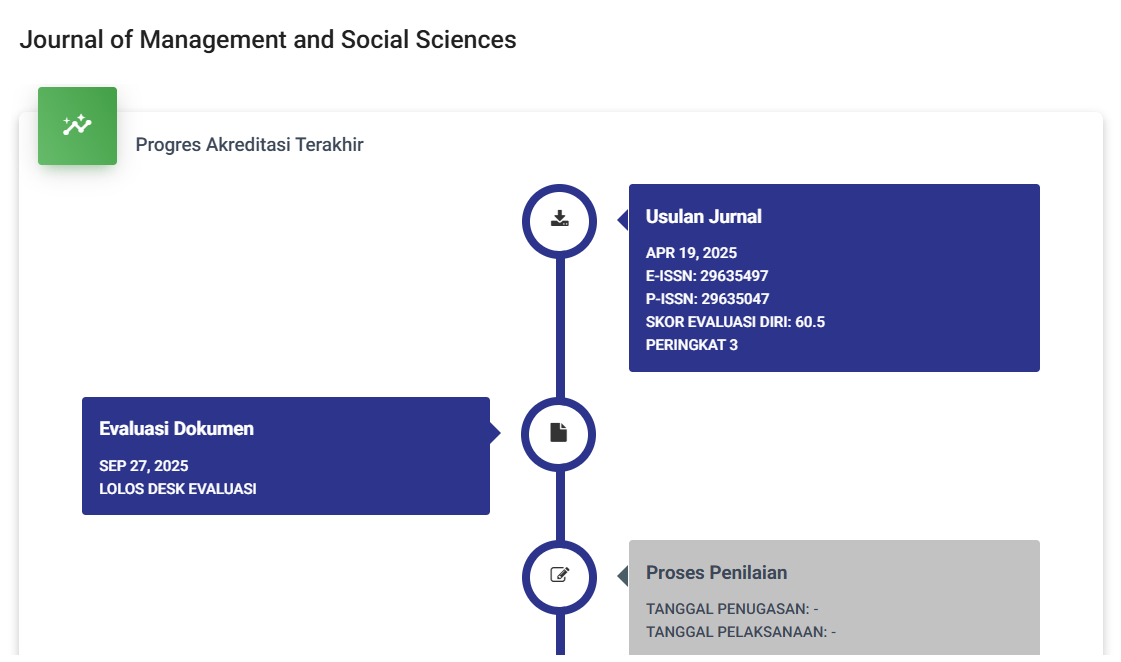Pengaruh Pengelolaan Anggaran Daerah Terhadap Kinerja Institusi Pemerintah Daerah
(Studi pada SETDA Kota Banjar)
DOI:
https://doi.org/10.55606/jimas.v3i4.1721Keywords:
Regional Budget Management, Regional Government Institution Performance, Budget Management EffectivenessAbstract
This study was initiated because there was a problem of decreasing employee work motivation. So the purpose of this study is to find out and describe: Management of the regional government budget in 2020 at the Banjar City Secretariat. The performance of regional government institutions at the Banjar City Secretariat after experiencing budget refocusing in 2020. The effect of regional budget management on the performance of regional government institutions at the Banjar City Secretariat after experiencing budget refocusing in 2020. The method used in this study is qualitative descriptive research. Based on the results of the research and discussion, it was concluded that Regional Budget Management based on respondents was in the very good category, with the highest average score occurring in the reporting dimension with an average of 252 or 85.59% (in the very good category) while the lowest score occurred in the administration dimension with an average of 211.5 or 71.69% (in the good category). To provide an interpretation of this value. If presented as a whole, the respondents' responses to Regional Budget Management were 80.04% when compared to table 4.16. then it is in the 4th interval which means that the respondents' responses to Regional Budget Management are included in the very good category. Respondents' responses to Regional Government Institution Performance with the highest score are in the relevant dimension with an average of 243 or 82.37% or in the very good category, while the lowest average score is in the Better Process dimension of 226.5 or 73.77% with a good category. If presented as a whole, the respondents' responses to Regional Government Institution Performance are 78.75% when compared to table 4.38. then it is in the 4th interval which means that the respondents' responses to Regional Government Institution Performance are included in the good category.
References
Atkinson, et al. (1997). Organisasi perilaku-struktur-proses (N. Adiarni & L. Saputra, Trans.). Jakarta: Bina Putra.
Baharun, H., Enas, E., & Noviana, R. L. (2022). Quality improvement as a strategy to build pesantren’s brand credibility. AL-ISHLAH: Jurnal Pendidikan, 14(1), 529–538. https://doi.org/10.35445/alishlah.v14i1.1583
Budianto, A., Bastaman, I. D., & Herman, F. (2020). Promotion mix, individual internal environment, and purchase decision making in minimarket. Jurnal Bisnis dan Manajemen, 21(1).
Chabib, S., & Suripto. (2011). Menilai kinerja pemerintahan daerah. Bandung: Fukus Media.
Darise. (2006). Manajemen SDM perusahaan. Bandung: Remaja Rosda Karya.
Darna, N., Faridah, E., Lestari, M. N., & Tinia, A. G. (2024). Talent management in facing the demand of environmental changes: A study in Galuh University. Sosiohumaniora, 26(1), 79–85. https://doi.org/10.24198/sosiohumaniora.v26i1.47161
Himpunan Peraturan Perundang-undangan. (2006). Undang-Undang Nomor 33 Tahun 2004 tentang Pengelolaan Keuangan Daerah.
Inpres Nomor 7 Tahun 1999 tentang Sistem Akuntabilitas Instansi Pemerintah (SAKIP).
Magno, R. B. (2015). Pengaruh pengelolaan anggaran terhadap kinerja organisasi pemerintahan.
Mardiasmo. (2014). Manajemen personalia: Manajemen sumber daya manusia. Ghalia Indonesia.
Mulyatini, N., Herlina, E., Akbar, D. S., & Prabowo, F. H. E. (2023). Analisis potensi pembentukan kawasan industri hasil tembakau dalam perspektif ekonomi. JPPI (Jurnal Penelitian Pendidikan Indonesia), 9(1), 334. https://doi.org/10.29210/020231920
Mulyatini, N., Herlina, E., Faridah, E., & Rozak, D. A. (1860). Human capital management model: A perspective of internal supervision in Indonesia. Talent Development & Excellence, 12(1), 1860–1868. http://www.iratde.com
Nuryani, L. K., Enas, E., Herman, M., Wahyudi, E., & Dianawati, L. (2022). Teachers’ perceptions of academic supervision in a pandemic era; phenomenological review. AL-TANZIM: Jurnal Manajemen Pendidikan Islam, 6(3), 679–692. https://doi.org/10.33650/al-tanzim.v6i3.3646
Peraturan Menteri Pendayagunaan Aparatur Negara dan Reformasi Birokrasi Republik Indonesia No. 54 Tahun 2014.
Sari, P., Muzaki, I. S., Mulyatini, N., Faridah, E., & Prawiranegara, B. (2019). Local own revenue, decentralization and local financial independent. Jurnal Manajemen Indonesia, 19(3), 250. https://doi.org/10.25124/jmi.v19i3.2413
Sugiyono. (2013). Metode penelitian pendidikan, pendekatan kuantitatif dan R&D. Bandung: Alfabeta.
Undang-Undang Republik Indonesia Nomor 23 Tahun 2014 tentang Pemerintah Daerah.
Undang-Undang Republik Indonesia Nomor 33 Tahun 2004 tentang Perimbangan Keuangan Antara Pemerintah Pusat dan Pemerintahan Daerah.
Verasvera, F. A. (2016). Pengaruh anggaran berbasis kinerja terhadap kinerja aparatur pemerintah daerah (Studi kasus pada Dinas Sosial Provinsi Jawa Barat).
Downloads
Published
Issue
Section
License
Copyright (c) 2024 Euis Suryamah, Nurdiana Mulyantini

This work is licensed under a Creative Commons Attribution-ShareAlike 4.0 International License.








